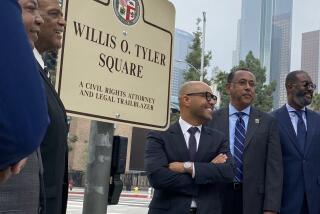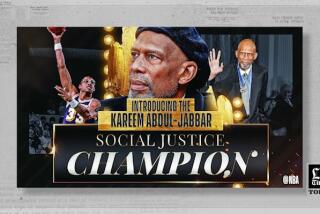Charles Perkins; Promoted Aboriginal Rights in Australia
- Share via
SYDNEY, Australia — Charles Perkins, a leading activist for Aboriginal rights in Australia, died Wednesday of complications from renal failure, family members announced. He was 64.
Perkins was among the first Aborigines to earn a university degree and the first to play professional soccer. He paved the way for future indigenous leaders by becoming a top-level civil servant.
Prime Minister John Howard, whom Perkins once described as “dopey,” said Perkins was a tireless fighter for Aborigines who voiced his views without fear or favor.
“He inspired great affection within the indigenous community,” said Howard. “His death does take a very significant figure, a person who left an enormous impression on the indigenous community.”
Aborigines number around 386,000 in a population of 19 million. They are the poorest, least healthy, least educated and most-often jailed members of Australian society.
Perkins made world headlines in April when he told British Broadcasting Corp. listeners not to come to the Sydney Olympics unless they were ready to see Aborigines rioting in the streets. The Aboriginal protests at the Olympics turned out to be small and peaceful.
Perkins’ comments reflected the passion with which he fought for Aboriginal rights for more than 45 years. Known among Aborigines as “Uncle Charlie,” Perkins’ sometimes gruff exterior hid a good-natured heart, friends said.
Born in 1936 in a shack near the central Australian town of Alice Springs to a white father and an Aboriginal mother, Perkins was an apprentice machinist before enrolling at the University of Sydney, where the novelty of his heritage and his outspoken nature prompted him to activism.
Inspired by protest marches in the United States led by Martin Luther King Jr., Perkins led a “Freedom Ride” in 1965 into Outback towns in New South Wales to confront segregation and discrimination.
Along with victories like ending a ban on Aboriginal children swimming at the public baths in the town of Bourke, the trip generated huge publicity and launched Perkins’ career.
Perkins led a small group of Aborigines onto the lawns of Australia’s parliament house in 1972 and erected an Aboriginal tent embassy. It still stands on the lawns of the old parliament and is protected under heritage laws.
He entered the government as a research officer in the late 1960s, then became head of the Department for Aboriginal Affairs. He resigned in 1988 amid a funding controversy.
“When he stood up in country towns in 1965 and said, ‘Aboriginal people are being discriminated against,’ it was a relatively lonely cause,” said New South Wales state premier Bob Carr. “It took a bit of bravery to do that.
“That’s how we should remember Charlie Perkins.”
More to Read
Sign up for Essential California
The most important California stories and recommendations in your inbox every morning.
You may occasionally receive promotional content from the Los Angeles Times.












